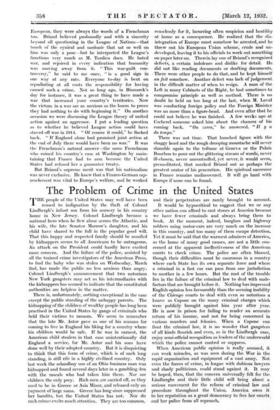The Problem of Crim e in the United States
THE people of the United States may well have been roused to indignation by the theft of Colonel Lindbergh's infant son from his nursery in his country home in New Jersey. Colonel Lindbergh became a national hero when he flew alone across the Atlantic, and his wife, the late Senator Morrow's daughter, and his child have shared to the full in the popular good will. That this happy and respected family should be assailed by kidnappers seems to all Americans to be outrageous. An attack on the President could hardly have excited more concern. And the failure of the police, assisted by all the trained crime investigators of the American Press, to find the baby who was stolen on Wednesday, March 2nd, has made the public no less anxious than angry. Colonel Lindbergh's announcement that two notorious New York gangsters may act as his intermediaries with the kidnappers has seemed to indicate that the constituted authorities are helpless in the matter.
There is, unfortunately, nothing exceptional in the case except the public standing of the unhappy parents. The kidnapping of the children of wealthy people has long been. practised in the United States by gangs of criminals who: held their victims to ransom. We seem to remember that the late Mr. Astor gave as one of his reasons for coming to live in England his liking for a country where his children would be safe. If he was in earnest, the American child stealers in that case unintentionally did England a service, for Mr. Astor and his sons have done well by their adopted country. But it is disquieting to think that this form of crime, which is of such long standing, is still rife in a highly civilized country. Only last week the schoolboy son of an Ohio business man was kidnapped and found several days later in a gambling den With the rascals who had taken him there. Nor are children the only prey. Rich men are carried off; as they used to be in Greece or Asia Minor, and released only on payment of large sums. ' Greece has long since suppressed lier bandits,' but the United States has not. • Nor do such crimes excite much attention. They are too common, - and their perpetrators are • rarely brought to account.
It would be hypocritical to suggest that we or any other nation can afford to cast stones at America because we have fewer criminals and always bring them to book. At the moment, indeed, burglars and highway robbers using motor-cars are very much on the increase in this country, and too many of them escape detection: Yet it must be said that the warmest admirers of America, as the home of many good causes, are not a little con- cerned at the apparent ineffectiveness of the American courts to check crime. The police are often blamed, though their difficulties must be enormous in a country where each State has its own separate force and where a criminal in a fast car can pass from one jurisdiction to another in a few hours. But the root of the trouble lies in the failure of the criminal law to deal with male- factors that are brought before it. Nothing has impressed English opinion less favourably than the seeming inability of the Chicago courts to deal with even so notorious a knave as Capone on the many criminal charges which were publicly brought against him year after year: He is now In prison for failing to render an accurate return of his income, and not for being concerned in various murders and felonies. When a Capone can flout the criminal law, it is no wonder that gangsters of all kinds flourish and even, as in the Lindbergh case, enjoy semi-official recognition as leaders of the underworld which the police cannot control or suppress.
When American public opinion is really aroused, it can work miracles, as was seen during the .War in the rapid organization and equipment of a vast army. Not even the forces of crime, in league with dubions lawyers and shady politicians, could stand against it. It may be hoped, then, that the concern universally felt for the Lindberghs and their little earl will bring about a serious movement for the reform of criminal law and procedure throughout the Union. America owes it to her reputation as a great:democracy to free her courts and her police from all reproach,


















































 Previous page
Previous page